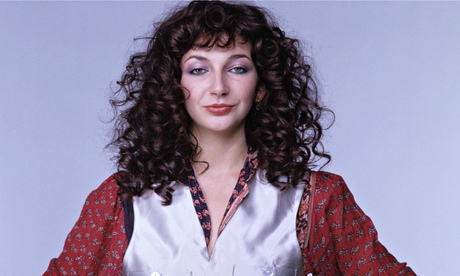
Since the concerts were announced, everyone has had something to say about why Kate Bush matters. For me Bush’s music touched parts of the brain that other less cerebral 70s singers didn’t come close to reaching.
For instance, her 1978 No 1 single Wuthering Heights rescued Emily Brontë’s novel from languishing dustily on school exam syllabuses, unloved by unmotivated teenage readers, and gave it a new generation of admirers. The plaintive refrain, “Heathcliff, it’s me, I’m Cathy, I’ve come home,” brought chillingly back to life the uncanny nightmare episode at the start of the book.
For me, though, the key song in Kate Bush’s repertoire is not Wuthering Heights but Babooshka, her Russian-ish single from 1980 – a hit in many countries, not least Britain, France and America.
As a London schoolgirl studying Russian at the time, I didn’t care at all that Kate Bush pronounced the Russian name with the stress in the wrong place, and clearly had no idea that it meant “granny”. I just remember being gobsmacked to realise that any sort of Russian theme could come up in the charts at all – let alone one that didn’t fit either of the two prevailing Russian stereotypes. In those iron curtain days, to my mind Russians were either Ealing countesses, the children and grandchildren of the dispossessed, impoverished, desperately genteel White Russians who’d escaped from the 1917 revolution with nothing but their titles. Or they were solid, slab-faced politburo men from the newspapers, in solid suits, with hair lacquered into silvery central committee quiffs which always rather reminded me of menacing ice-cream cones.
Then suddenly this weird little fairytale about a love test gone wrong, full of the chirpy yet minor cadences of eastern folk and gypsy music, was on everyone’s lips all over the western world.
The song tells the story of a wife trying to check her husband’s loyalty by sending him notes purporting to come from a younger woman, which she signs “Babooshka”. Her fear that her husband no longer sees her as young and attractive are borne out by the barbed lines conveying his thoughts: “Just like his wife before she ‘freezed’ on him / Just like his wife when she was beautiful”. The trap is set when, in her bitterness and paranoia, Babooshka arranges to meet her husband, who is attracted to her alter-ego character because she reminds him of his wife in earlier times – and so she lets her fears ruin her marriage.
The video featured Bush beside a double bass symbolising the husband, wearing a black bodysuit and a veil in her role as the embittered wife, then changing into an extravagant, myth-like and rather sparse “Russian” costume as Babooshka. It was a kind of mass-culture rethink of some of the themes of Lady Macbeth of Mtsensk District, the Shostakovich opera which had so annoyed Stalin – the plotting, the secretiveness, the centrality of human relationships instead of politics, and that wily female desperation bringing tragedy in its wake.
But at the time the important thing was that Babooshka’s story, with its dancey, faintly eastern-sounding music and the emotional subtlety that toned down its cruelty, helped blow away the cobwebs from what most people then thought they knew about life on the communist side of Europe. It was proof that Russians weren’t all about Pravda and giant factories and dreary rolled-steel statistics, after all. There were real people out there, too: people who liked their wild love songs in a minor key; people with hearts, sometimes broken; people struggling to escape frustrating situations.
This made Babooshka a helpful soundtrack as the vast political changes began, very soon afterwards, on the eastern side of 1980s Europe – changes that would eventually bring the divided continent back together. The song opened millions of western hearts and minds to the possibility that the easterners they were reading about were no longer anonymous foot soldiers in a cold war that was ending, but rather flesh-and-blood folks like them.
Certainly by the time I started reporting on Russia in 1991, it had become standard for kindly mentors to advise young journalists heading for Moscow that the interesting thing there, these days, wasn’t the politicians. It was the human interest stories – the “babooshkas”. They always stressed it Bush’s way, too.
And so, when Kate Bush comes on stage this week to sing Babooshka, to a London which, a generation later, is teeming with people from all over post-cold war Europe, I hope they’ll forgive the nonsense meaning the song gives the word, and the wrong stress. Bush didn’t bring the Iron Curtain down single-handedly it’s true, but her song was certainly part of the evolution in thinking that eventually destroyed barriers and reunited the people of Europe – and could do in these strained times once again.

